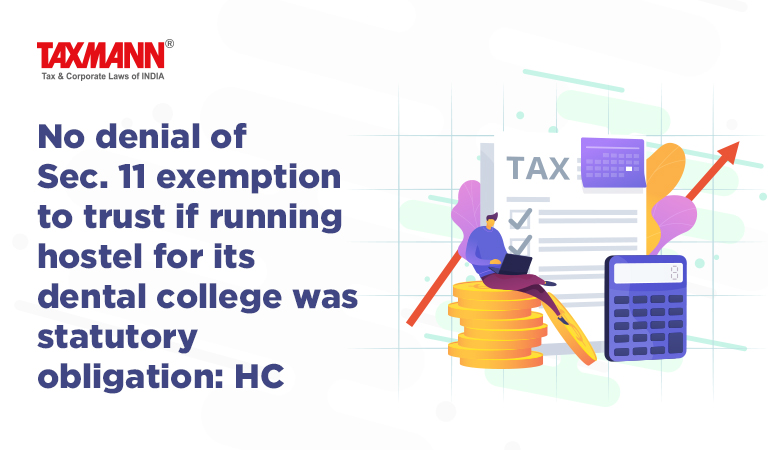No denial of Sec. 11 exemption to trust if running hostel for its dental college was statutory obligation: HC
- Blog|News|Income Tax|
- 2 Min Read
- By Taxmann
- |
- Last Updated on 15 December, 2025

Case details: Daya Nand Pushpa Devi Charitable Trust v. ACIT - [2021] 128 taxmann.com 118 (Allahabad)
Judiciary and Counsel Details
-
- Mrs. Sunita Agarwal and Deepak Verma, JJ.
- Abhinav Mehrotra and Vivek Pratap Singh for the Appellant.
- Praveen Kumar for the Respondent.
Facts of the Case
Assessee-Trust was running a Dental College and a hostel for the residence of the students admitted to the said college. Trust claimed that all its activities were covered under section 2(15) of the Income-tax Act 1961.
During the assessment, Assessing Officer (AO) concluded that the hostel activities of the trust were separable from its educational activities. Further, the way the hostel and mess activities are being carried on would fall within the meaning of “business” under section 2(13). Therefore, the trust couldn’t be treated for ‘charitable purposes’, and consequently benefit of section 11 couldn’t be allowed to it.
On appeal, the assessment order was affirmed by both the CIT(A) and the Tribunal. Aggrieved-assessee filed the instant appeal before High Court.
High Court Held
The High Court held that the hostel was being run by the trust to discharge a statutory obligation as the institution in question couldn’t impart dental education without providing for the hostel. There was no dispute about the fact that the assessee had provided hostel and mess facilities only to those students who were attached with the educational institution. Further, it was not the case of the revenue that the income generated out of the hostel fees was not used for educational purposes.
The only reason given by AO to deny exemption was that the income from the hostel fee was excessive and disproportionate to the income derived by other educational institutions which indulge in similar activity i.e. maintaining hostel for the students admitted in the institution, whether government or private. However, such a comparison was not open, in as much as, whether an activity of the assessee was a business venture separable from its main activity, to be decided on the facts and circumstances of the individual case, i.e. looking to the nature of the establishment and its activities. Thus, exemption under section 11(1) could not have been disallowed to the trust.
Disclaimer: The content/information published on the website is only for general information of the user and shall not be construed as legal advice. While the Taxmann has exercised reasonable efforts to ensure the veracity of information/content published, Taxmann shall be under no liability in any manner whatsoever for incorrect information, if any.

Taxmann Publications has a dedicated in-house Research & Editorial Team. This team consists of a team of Chartered Accountants, Company Secretaries, and Lawyers. This team works under the guidance and supervision of editor-in-chief Mr Rakesh Bhargava.
The Research and Editorial Team is responsible for developing reliable and accurate content for the readers. The team follows the six-sigma approach to achieve the benchmark of zero error in its publications and research platforms. The team ensures that the following publication guidelines are thoroughly followed while developing the content:
- The statutory material is obtained only from the authorized and reliable sources
- All the latest developments in the judicial and legislative fields are covered
- Prepare the analytical write-ups on current, controversial, and important issues to help the readers to understand the concept and its implications
- Every content published by Taxmann is complete, accurate and lucid
- All evidence-based statements are supported with proper reference to Section, Circular No., Notification No. or citations
- The golden rules of grammar, style and consistency are thoroughly followed
- Font and size that’s easy to read and remain consistent across all imprint and digital publications are applied



 CA | CS | CMA
CA | CS | CMA
